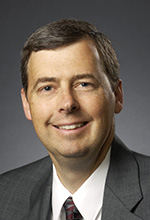Timothy Cahill
Vice President, Air and Missile Defense, LOCKHEED MARTIN MISSILES AND FIRE CONTROL
BSAAE 1987, MSAAE 1988
For significant contributions to the field of aerospace engineering by offering superior technical and managerial impact directly advancing many of our nation’s leading air and missile defense systems.
The senior design course Tim Cahill took at Purdue not only changed his “way of thinking,” but its corporate sponsors — representatives from Lockheed Martin’s Fleet Ballistic Missile Program — foreshadowed his professional future.
“Little did I know that 31 years later I would take over as vice president of the division that includes the Fleet Ballistic Missile Program, having joined Lockheed Martin after a tour in the U.S. Air Force,” Cahill says.
Until that senior design course opened his eyes to engineering’s expansive and complex big picture, Cahill says most of his courses were single-discipline focused. “The design course forced me to understand how all the elements — structures, propulsion, dynamics, etc. — came together and had to be traded to build a complex design,” he says.
Cahill says his teaching assistant work under Winthrop Gustafson, now professor emeritus of aeronautical and astronautical engineering, was even more formative: “I learned more doing this than at any other single time in my college education. Dr. Gustafson’s willingness to let me be an integral part of the course development and instruction — and his patience as I learned and made mistakes — was an invaluable experience for me in the years ahead.”
At Lockheed since 1995, Cahill has used his education to excel in several positions with increasing responsibility. He began as an engineer in its Space Systems’ Special Programs and today is vice president of Integrated Air and Missile Defense Systems for Lockheed Martin Missiles and Fire Control.
Cahill says his Purdue degree carried a lot of weight in the working world he entered decades ago — and it still does today: “Purdue has a tremendous reputation in industry. When people know you are a Purdue engineering graduate, they have high expectations and are willing to give you stretch assignments to prove yourself, even when you are junior in your career.”
Cahill still appreciates how Purdue taught him — pushed him — to think, rather than merely memorize. “There was always discussion on why something was important, where there was direct applicability in industry and how each discipline balanced with the others.”
If given the chance to advise students today, Cahill says he’d be sure to remind them that making the most of their education at Purdue is about more than classes and labs: “What you do outside of class is important, too. Get involved. Take some downtime for social events. Spend time with friends. Don’t get stressed when a class, test or paper goes awry. Correct what you can, learn from it and move on. In a few short years you won’t even remember it!”
Change is the law of life. And those who look only to the past or present are certain to miss the future. Leadership and learning are indispensable to each other.”John F. Kennedy
Career Highlights
| 2016-present | Vice President, Air and Missile Defense, Lockheed Martin Missiles and Fire Control |
|---|---|
| 2014-2016 | Vice President and General Manager, Strategic and Missile Defense Systems, Lockheed Martin Space Systems |
| 2012-2014 | Vice President, Central Engineering, Lockheed Martin Space Systems |
| 2010-2012 | Vice President, P734, Lockheed Martin |
| 1988-1995 | Captain, United States Air Force |
Education
| 1987 | BSAAE, Purdue University |
|---|---|
| 1988 | MSAAE, Purdue University |
| 2008 | MBA, Stanford University |

